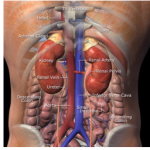The Kidneys are one of the most important organs of the excretory system in human beings. The other organs are the liver, the lungs, and the digestive system. The kidneys filter blood and excrete the final products of metabolic activities and various other substances in body fluids including surplus water and electrolytes in urine. The kidney also produces hormones that are important for red blood cell formation (Erythropoietin), control of blood pressure (Renin) and calcium metabolism (1,25-dihydroxycholecalciferol, a form of active vitamin D3).
What are the functions of the kidneys?
The Kidneys are one of the most important organs of the excretory system in human beings. The other organs are the liver, the lungs, and the digestive system. The kidneys filter blood and excrete the final products of metabolic activities and various other substances in body fluids including surplus water and electrolytes in urine. The kidney also produces hormones that are important for red blood cell formation (Erythropoietin), control of blood pressure (Renin) and calcium metabolism (1,25-dihydroxycholecalciferol, a form of active vitamin D3).
How are the kidneys to look at?
Each kidney is a bean shaped organ. Almost all people have two kidneys. These kidneys are located on either side of the vertebral column, high up in the back, partly protected by the lower ribs. Reddish brown in color, each kidney weighs around 150 gram; it weighs a little less in females. Its length is around 4-5 inches, and the width, around 3 inches.
What is special about the function of the kidneys?
Though it weighs only 150 gram, its filtration function requires about 25% of all the blood that is pumped out of the heart. This in itself is a measure of its importance in the body. In comparison, the brain draws only about 10% of the blood output from the heart even if it weighs around 1.5 kg or 10 times more than the kidney. Even the heart does not require so much blood for its pumping function.
Are both the kidneys of the same size?
No, the right kidney tends to be slightly smaller than the left kidney, partly because of its position under the liver.
Do all human beings have two kidneys?
No, about 1 in 1000 individuals is born with a single kidney. Normal life is possible with a single kidney provided it is functioning normally and certain precautions are taken to minimize the risks to the solitary functioning kidney. A person having two normally functioning kidneys can donate one kidney to his or her relationship having irreversible renal disease and can continue to lead a normal life. The future life span or quality of life of a person who has undergone surgical removal of a diseased or badly injured kidney will not be affected by surgical removal if the other kidney is functioning well.
Is it possible for a person to have more than two kidneys?
Yes, but it is very rare. So far, only about 150 – 200 people have been documented to have more than 2 kidneys.
Is it possible for the kidneys to be in some other place than high up in the back?
Yes, it is not uncommon for a person to have one or both of the kidneys in some other place within the abdominal cavity. It may be behind the uterus, behind the bladder or midway between the bladder and the liver; both kidneys may be present on the same side.
The shape and orientation of the kidneys may also be different. These differences are not important if there is no associated obstruction or abnormality in renal function.
What is the earliest age in which we can find out any abnormality in the kidney?
Structural abnormalities in the kidneys can be detected as early as fourth to fifth month of the pregnancy. The numbers of kidneys and enlargement and obstruction in the urinary passage can be identified on ultrasound examination.
What are the symptoms of any renal disease?
The common symptoms of kidney disease are slow urination, thin urinary stream, pain or burning sensation when passing urine, blood in the urine, foul-smelling urine, bed-wetting, passage of stones in the urine, pain in the back or side of the abdomen, swelling of the face, feet or entire body, decrease or increase in urine output, high blood pressure, loss of appetite etc. Kidney disease can also be silent; it may be detected incidentally during a routine examination or during evaluation for other ailments. Some of the symptoms are not specific for kidney disease and any unusual symptom, especially in a young patient, must be investigated.

